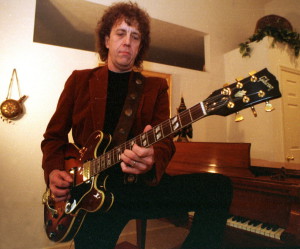Bob Welch (Robert Lawrence Welch, Jr)

Bob Welch
was a key member of the pop group Fleetwood Mac in the early 1970s before scoring several minor hits as a solo performer, died June 7 at his home in Nashville. He was 65.
According to police, he died of a self-inflicted gunshot wound. He left a suicide note.
Mr. Welch was a guitarist, vocalist and songwriter for Fleetwood Mac from 1971 to 1974. The band was formed in England in the late 1960s by guitarist Peter Green, and its name derived from two members of the group, drummer Mick Fleetwood and bassist John McVie.
After Mr. Welch replaced Green in 1971, he had a major part in reshaping Fleetwood Mac’s sound to a sweeter, more pop-oriented approach. He wrote the song “Hypnotized,” which appeared on the group’s 1973 album, “Mystery to Me,” and was a key member of the band through five albums, including “Heroes Are Hard to Find” (1974).
“He was a huge part of our history, which sometimes gets forgotten,” Mick Fleetwood told Rolling Stone. “Mostly his legacy would be his songwriting abilities that he brought to Fleetwood Mac, which will survive all of us.”
Mr. Welch left the band in 1974, just before singer Stevie Nicks and guitarist Lindsey Buckingham joined the group. The reconstituted band had its breakthrough albums with “Fleetwood Mac” in 1975 and “Rumours” in 1977, both of which reached No. 1 and sold millions of copies.
“A strong argument can be made that without Welch’s contributions, Fleetwood Mac would not have been in the position to make ‘Rumours’ in 1977,” Cleveland Plain Dealer critic Michael Norman wrote in 1998. “Welch pushed the band toward the pop mainstream in albums such as ‘Future Games,’ ‘Bare Trees,’ and ‘Heroes Are Hard to Find.’ ”
After leaving Fleetwood Mac, Mr. Welch briefly led another band in England before becoming a solo artist. He scored his biggest hit in 1977 with “Sentimental Lady,” a catchy pop song that he first recorded with Fleetwood Mac. Christine McVie and Buckingham sang backup vocals on the tune, which peaked at No. 8 on the Billboard pop chart.
Mr. Welch’s song “Ebony Eyes” reached No. 14 on the Billboard pop chart in 1978. His other singles included “Hot Love, Cold World” (1978) and “Precious Love” (1979).
In 1994, Mr. Welch sued Fleetwood Mac, claiming that he had been denied royalties. The case settled out of court in 1996.
When Fleetwood Mac was inducted into the Rock and Roll Hall of Fame in 1998, Mr. Welch was not invited to the ceremony.
“I’m really disappointed about being overlooked by Fleetwood Mac,” he told the Plain Dealer at the time. “It basically comes down to the fact that they don’t like me anymore. . . . I could understand it if I had been a sideman for a year. But I was an integral part of that band for five years. I put more of myself into that band than anything else I’ve ever done.”
Robert Lawrence Welch Jr. was born July 31, 1946, in Los Angeles. His father, Robert L. Welch, was a Hollywood producer and writer who produced several movies, including Bob Hope’s “The Paleface” (1948) and “The Lemon Drop Kid” (1951). He also produced the Academy Awards program in 1953, the first year it was presented on television.
“I grew up in a show-biz environment,” the younger Mr. Welch told Nashville’s Tennessean newspaper in 2003. “Jonathan Winters would come to the house. Yul Brynner lived across the street.”
Mr. Welch was interested in jazz and blues in his youth and became drawn to the music of such 1950s performers as Johnny Cash, the Everly Brothers and Elvis Presley.
He studied French at UCLA and later at the Sorbonne in Paris, where he lived for several years. He once formed a group called Paris.
In 1999, he released “Bob Welch Looks at Bop,” a poorly received album that combined modern pop with classic bebop elements of jazz.
After a stint at a drug rehabilitation center in the 1980s, Mr. Welch lived in Phoenix for several years. He tried to revive his solo career, but in 1990 a St. Louis Post-Dispatch reviewer described one of his performances as “an unfortunate glimpse of a rock career on the downslide.”
He settled in Nashville in the 1990s and concentrated on writing songs. Some of his tunes were recorded by Kenny Rogers, Sammy Hagar and the Pointer Sisters.
Mr. Welch reportedly had spinal surgery several months ago and had told friends that he did not want his wife to bear the responsibility of caring for him if he became an invalid.
His wife of 27 years, Wendy Armistead Welch, is his only known survivor.
“I never wanted to be a guitar gunslinger and a star,” Mr. Welch said in 2003. “I just wanted to make that great music.”
Born
- August, 31, 1945
- Los Angeles, California
Died
- June, 07, 2012
- Antioch, Tennessee
Cause of Death
- self-inflicted gunshot wound to the chest
Cemetery
Other
- Unknown

